 Kent Coast Sea Fishing Compendium |
Kent Coast Sea Fishing Compendium |
A compendium of articles, maps, charts, drawings, photographs and book extracts of relevance to sea fishing on the north and east Kent coasts and, in particular, to the following 194 shore and inshore fishing venues and marks on the 214 mile (345 km) Kent coastline:
Gravesend
Greenhithe Promenade, Ship and Lobster (Denton Wharf, Gravesend), Gravesend Promenade, Gravesend Sea School (site of), Shornemead Fort, Black Post, Shornemead Lighthouse, Higham Marshes, Allhallows, Yantley Creek, The Flats, Hoo
Sheppey
Kingsferry (bridge), West Minster Wall, Mile Town Beaches, Garrison Point Sheerness, Garrison Beaches, Catholic Church to the Jetty, Coal Pier (adjacent to Sheppey Sailing Club), Blockhouse (opposite the Ship-on-Shore pub), Garrison Point to Boom, Boom to Shellness, Shellness to the Saltings (the river Swale), the Saltings (from the old Kingsferry bridge to the Elmley nature reserve), Cheyney Beaches, Marine Town Beaches, Barton's Point (formerly Rifle Range Beaches), Barton's point to the Whitehouse (shingle bank), Whitehouse to the Little Oyster car park (The Leas), Little Oyster to the end of the new sea wall (Minster), Minster and Warden Beaches, Warden Point, Eastchurch Gap, Leysdown Beaches, the Swale (from Harty to Queenborough and from Crundels Wharf to the stumps), Rushenden Bay, Queenborough (Medway Estuary), West Minster to Garrison Point
Whitstable
Seasalter, Long Beach, Whitstable Bay, Whitstable Street, Tankerton Bay, Swalecliffe Bay, Studhill Bay
Isle of Thanet (Herne Bay, Margate & Broadstairs)
Hampton Jetty, Herne Bay, Herne Bay Pier, Beltinge Bay, Bishopstone Glen, Bishopstone Rocks, Reculver (and Margate Sand, Pan Sand, Pan Sand Inner Bank, Copperas Channel and Woolpack boat fishing marks)
Minnis Bay, Grenham Bay, Birchington-on-Sea, Beresford Gap, Epple Bay
Westgate Bay, West Bay, St Mildred's Bay, Westbrook Bay (formerly Infirmary Bay), Nayland Rock, Margate Bay, Fulsam Rock, Walpole Bay, Palm Bay
Foreness Point, Botany Bay, Killicks Hole, The Platform, White Ness, Kingsgate Bay, Joss Bay (Joss Gap), Stone Bay, Broadstairs Harbour, East Cliff, Viking Bay, Louisa Bay, Dumpton Point (South Cliff), Dumpton Bay (Dumpton Gap)
Ramsgate
Ramsgate harbour piers (east and west), Eastern Chine, The Groyne, Marina Slopes, Eastern Arm, Western Undercliffe (and three boat fishing venues at Stour Estuary, Pegwell Bay and Goodwin Sands)
Sandwich Bay
Sandwich Bay, Chequers, Sandwich Bay Sailing and Water-ski Club (slipway at Cambridge Avenue), Royal Cinque Ports Golf Club (10th green), Sandhills (between Sandown Castle and the 6th green)
Deal & Walmer
Sandown Castle, Deal beach (Harold Road, the groynes and coastguard station), Deal Pier and Walmer beach (the monument, Cambridge Road Gardens, flat-top tree, Walmer Castle and Boundary Road)
Deal & Walmer Inshore
Goodwin Sands, Walmer Castle area, Marne Rocks, Bank Buoy, Trawler Buoy, Sandhills Area, No 1 Buoy, Trinity Bay, South Brake Buoy, Pier Area, "North-Eastern Victory", "S.S. Patria", "Adjutant"
Kingsdown
Kingsdown beach, Kingsdown Butts, Oldstairs Bay, "Wheatman" (off Kingsdown)
St Margaret's Bay
St. Margaret's Bay
Dover
Dover beach, Prince of Wales Pier, Admiralty Pier, Southern Breakwater (Knuckle), Shakespeare beach, The Warren, Samphire Hoe (and boat fishing venues at Fan, Crab and Langdon Bays and six fishing stations east of Admiralty Pier opposite (1) Langdon Steps, (2) The Cobbler, (3) Convict Prison (site of), (4) East Cliff Tunnel, (5) Guilford Battery (site of) and (6) Edinburgh Boarding House (site of) and six fishing stations west of Admiralty Pier opposite (1) Lord Warden Hotel and Trinity House Tower, (2) Shakespeare Cliff Point and Landslip, (3) Shakespeare Cliff Point and Coal Mine (site of), (4) Coal Mine (site of) and Channel Tunnel Landmark, (5) Coal Mine (site of) and Lydden Spout, and (6) Lydden Spout Old Coastguard Station (site of)
Folkestone, Sandgate & Seabrook
East Cliff, East Wear Bay, Folkestone Harbour Arm, Rotunda Beach, Mermaids Café, Sandgate Riviera, Sandgate Castle, Brewers Hill, Seabrook (Sandgate Esplanade), Princes Parade (and five boat fishing venues at Varne Bank, The Ridge, Warren Bay, Rough Ground and Metropole Rocks)
Hythe, Dymchurch, St Mary's Bay, Littlestone, Greatstone & Lydd
Twiss Groyne, Hythe Marine Parade, Hythe Swimming Pool, Yacht Club, Ocean Eleven, Fishermen's Beach, Hythe Army Ranges, Hythe Redoubt Corner, Willop Sluice, Martello Tower (Sunny Sands Estate), Dymchurch beach, St Mary's Bay, Pirate Springs, Littlestone-on-Sea, Littlestone Wall, Greatstone, Lydd-on-Sea, Taylor Road, Pilot Inn (and Mulberry Harbour, an inshore fishing venue off Littlestone)
Dungeness
Back-of-the-Boats, Dungeness Point, Walkway, Dungeness beach, Outfall, Diamond, Denge Marsh, Galloways, Jury's Gap, Camber Sands (the Rother)
Piscatoribus sacrum mare
"A Treatyse of Fisshynge wyth an Angle" (1496) attributed to Dame Juliana Barnes (Berners)
Prologue
Solomon in his proverbs says that a good spirit makes a flowering age, that is, a happy age and a long one. And since it is true, I ask this question, "Which are the means and the causes that lead a man into a happy spirit?" Truly, in my best judgement, it seems that they are good sports and honest games which a man enjoys without any repentance afterward.
Thence it follows that good sports and honest games are the cause of a man's happy old age and long life.
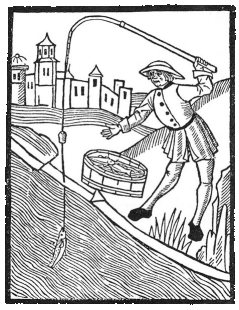
And therefore, I will now choose among four good sports and honest games: to wit, of hunting, hawking, fishing, and fowling. The best, in my simple opinion, is fishing, called angling, with a rod and a line and a hook. And of that I will talk as my simple mind will permit: not only because of the reasoning of Solomon, but also for the assertion that medical science makes in this manner:
Haec tria - mens laeta, labor, et moderata diaeta.
If you fall short of doctors, physicians will be
these three - the happy mind, work, and moderate diet.
You shall understand that this means, if a man lacks physicians, he shall make three things his physicians, and he will never need any more. The first of them is a happy mind. The second is work which isn't too onerous. The third is a good diet.
First, if a man wishes ever more to have merry thoughts and be happy, he must avoid all quarrelsome company and all places of debate, where he might have any causes to be upset. And if he wishes to have a job which is not too hard, he must then organise, for his relaxation and pleasure, without care, anxiety, or trouble, a cheerful occupation which gives him good heart and in which will raise his spirits. And if he wishes to have a moderate diet, he must avoid all places of revelry, which is the cause of overindulgence and sickness. And he must withdraw himself to places of sweet and hungry air, and eat nourishing and digestible meats.
Now then, I will describe these sports or games to establish, as well as I can, which is the best of them ...
It follows then without doubt that the best sport must be fishing with an angle. For every other kind of fishing is also exhausting and painful, often making folk wet and cold, which has been seen frequently to bring serious illness. But the angler need suffer no cold nor disease nor annoyance, unless he brings it on himself. For he may not lose at the most but a line or a hook, of which he may have plenty of his own making, as this simple Treatise shall teach him. Even then his loss is not serious. He may have no other annoyance, unless a fish break away after taking the hook, or he catches nothing; which are not serious annoyances. If he does not catch one fish he will catch another, so long as he follows the teaching of this Treatise; unless indeed there is nothing in the water. Even then he has a wholesome walk and is happy at his ease in the fresh air, sweet with the scent of meadow flowers, which gives him an appetite. He hears the melodious harmony of birds; he sees the young swans, herons, ducks, coots, and many other birds with their broods. This seems to me better than all the noise of hounds, the blasts of horns, and the birdcalls, that hunters, falconers, and wildfowlers can make.
If the angler catches fish no one is happier in spirit than he. Also whoever wishes to go angling must rise early, which is good for man in this way: that is to say, good for his soul for it shall make him holy; and his body healthy by making him whole; also it shall increase his goods for it shall make him rich. As the old English proverb has it: "Who rises early shall be holy, healthy, and happy."
Thus I have proved, as I set out to do, that the sport and game of angling is the very thing to induce in a man a merry spirit; which, according to the said parable of Solomon and the said medical doctrine, will give him a flourishing life and a long one. Therefore to all you who are virtuous, gentle, and freeborn I write and make this simple Treatise following, by which you may learn the full craft of angling to enjoy yourselves whenever you wish; to the intent that your old age may be the more flourishing and the longer to endure.
Click The Treatyse of Fysshynge with an Angle to read the entire text and detailed commentary by Alfred Duggan
"The Art of Angling, Rock and Sea Fishing: with the Natural History of River, Pond and Sea Fish" (1740) Richard Brookes [8]
The Preface
As to the Treatise in general, I have endeavour'd to make it in some sense useful to all, but especially to the younger sort, who may by this means come to be acquainted with the great variety of Watry Inhabitants with little trouble or expence. Nor can this be thought a vain or an unprofitable amusement, since the more knowledge we have of the nature of things, the more we must admire the wisdom of the Divine Architect.
[8] Editor's Note: First published by Richard Brookes, M.D. (1721 - 1763) in 1740, this popular book was reworked for the rest of the 18th century, reaching at least nine editions by 1801. Brookes' account is weighted more towards natural history than techniques for capturing fish, some of which he describes are of a sort only incidentally caught by commercial fishermen such as the "porpuss", hammerhead shark and "sea serpent":
"The Sea-Serpent is commonly about five feet long. The body is exactly round, slender, and of an equal thickness, except towards the tail, where it grows sensibly more slender. The colour of the upper half is of a dusky yellow, like the dark side of old parchment or vellum; the lower part is of a brightish blue. The snout is long, slender, and sharp, and the mouth opens enormously wide. The flesh is very well tasted and delicate, but is full of very small bones, and therefore cannot be eaten without some trouble. It is taken very frequently in the Mediterranean."
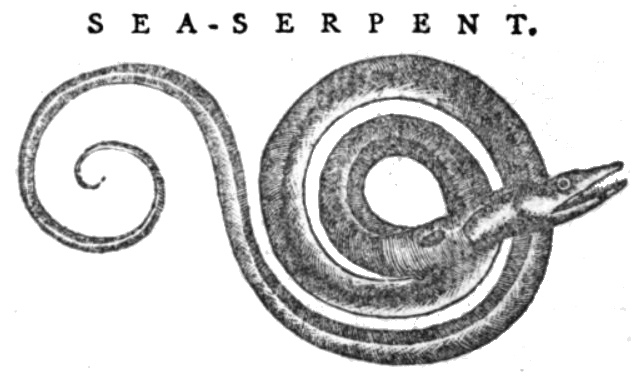
Click The Art of Angling, Rock, and Sea Fishing to read online
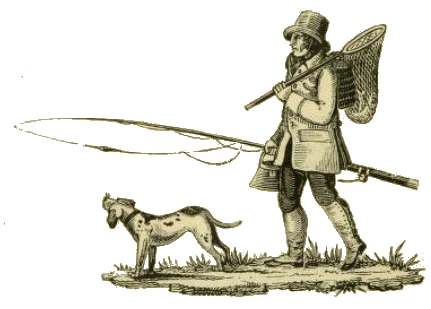
"The Angler's Guide: being a new, plain, and complete practical treatise on the art of angling for sea, river, and pond fish; deduced from many years' practice, experience, and observation. To which is added, a treatise on trolling" (1825) Thomas Frederick Salter at pages v & vi
Preface
… In writing this treatise on angling, my pen has always been guided by a love of truth, and a sincere desire to improve an art in which I so much delight; and the publication of it proceeds wholly from a conviction that a plain practical guide to the art of angling was wanted; … This information is particularly needed by the juvenile sportsman, as the old practitioner is, generally speaking, by no means communicative; and I have often witnessed the evasive answers of old anglers, when applied to on the subject: indeed, it is a very common practice for those who are masters of the art, to discontinue angling, and move away, when accosted by strangers or a novice.
Click The Angler's Guide to read online
"Sea Fish & How to Catch Them" (1863) William Barry Lord at pages iii & iv
Those of my readers who have chanced, in their wanderings, to have been, like me, cast into all sorts of odd nooks and corners of this world of ours, will not fail to remember how requisite it is to be enabled to fall back on some such occupation as fishing, to pass pleasantly away hours which would otherwise pass slowly or, perchance, gloomily. Few places are there visited by travellers, emigrants, or military men, where fish of some kind (sometimes odd enough, I admit) are not to be lured from their natural element into the bag or basket of their pursuer, if properly equipped for their capture, often furnishing an excellent and abundant meal, where short commons would, in their absence, have been the order of the day.
Click Sea Fish & How to Catch Them to read online
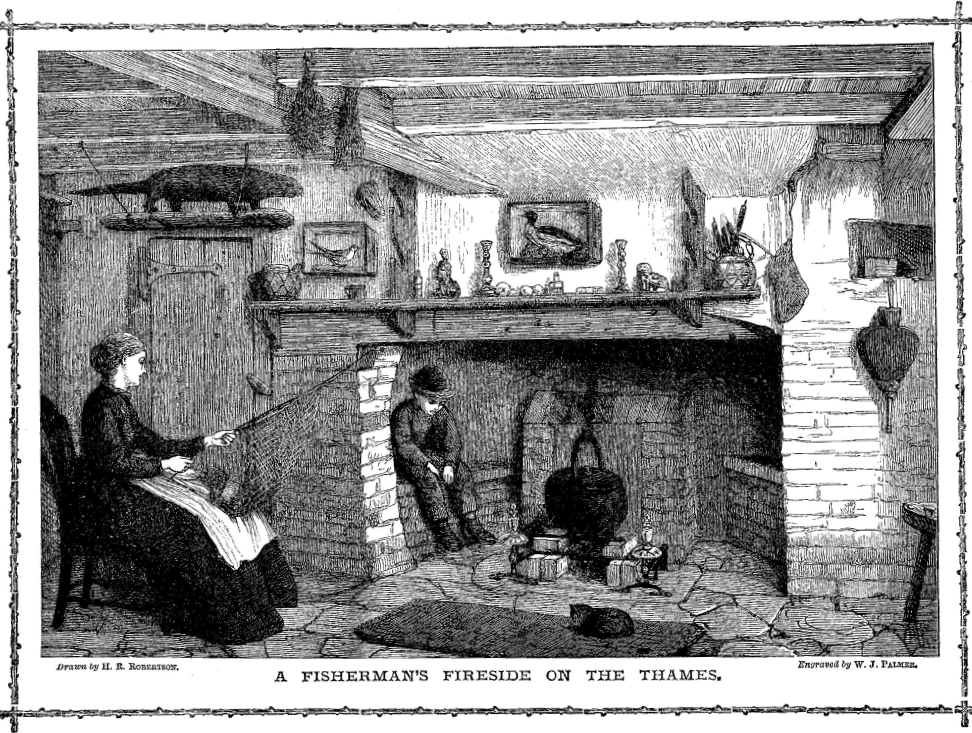
"A Fisherman's Fireside on the Thames"
Home Words (1879), a national parish magazine, founded by Charles Bullock, Rector of St Nicholas, Worcester, in 1871
"The Sea-Fisherman" (1884 - 4th edition) James Carrall Wilcocks at pages 1, 2 & 10
Introduction
There can be little doubt that the greater facilities of transit afforded us by the extension of the railway system - inasmuch as they have vastly increased, and in many cases created a great passenger traffic to the coast - have been the means of causing a demand for information on the subject to which this work is devoted. Sea-side visitors must find some occupation pour passer le temps: the monotony of the marine parade becomes wearisome, notwithstanding the attempts at its alleviation by calling in the aid of the last new novel from the library - but they cannot read all day; walking in the heat is not agreeable; everyone is not interested in the study of marine zoology, fashionable as it has become of late years, and deservedly so, although the furore has now somewhat abated; the common objects of the sea-shore fail to afford amusement; they have had a complete surfeit of German bands; mind and body are alike satiated with that fashionable and intellectual amusement so perseveringly followed by beach hunters of all ages, to wit, pelting Father Neptune with the pebbly shingle where there is any to the fore; even the row or the sail require some additional zest. What, then, is there at hand to supply the desideratum? Nothing - positively nothing but Sea-fishing, which in its various phases, afloat or from the shore, affords a field of observation and occupation of which the world at large can have but small conception.
The Possible Bag
… is very useful for travellers, who naturally wish to add as little as possible to their impedimenta. Let it contain a brass tobacco-box, with loose hooks and swivels, two or three hanks of snooding wound on cotton reels, a hank of gut, also a skein of thread, and a bit of shoemaker's wax in leather.
"Angling in Salt Water: A Practical Work on Sea Fishing with Rod and Line from the Shore, Piers, Jetties, Rocks and from Boats" (1887) John Bickerdyke at page 1
Chapter I: Introductory
In a work intended to be purely practical, anything in the nature of a dissertation on the origin of angling would be out of place, so I will merely ask the reader to believe me when I say that the sport of angling is as ancient as it is delightful. Not until comparatively recent years, however, has fishing with rod and line in salt water come much into vogue, and even now the number of anglers who pursue that branch of the sport is extremely limited. In salt water, fish are certainly less difficult to catch than in fresh; but for all that, there is a right and wrong way to catch them, and he who takes the latter path had best remain at home.
Sea-Fishing on the English Coast (1891) Frederick George Aflalo at page 3
Part I - Chapter I
Sea-Fish and their Haunts, Locality, Weather
I must beg to be excused from furnishing my readers with any oration on the beauties of sea-fishing: let them try and find them out for themselves, and they will acknowledge them all the more readily. I will therefore plunge at once into the sea and the subject.
"The Sea and the Rod" (1892) Deputy Surgeon-General Charles Thomas Paske & Frederick George Aflalo at pages 14, 15 & 17
Chapter I
On Sea Fishing in Particular
Fishing at sea with the hand-line is as old almost as man himself; but the use of the rod along our coasts is an essentially modern innovation, and one that does not, even now, quite escape the boisterous, though harmless and somewhat crude, ridicule of the professionals.
Last year I converted one of them to the faith of the rod, a process that occupied three days: the first undermined his confidence in the old order of things; the second completely destroyed it; the third decided him in favour of the new. Had this intelligent young fellow been an "old salt" well pickled in long-standing prejudices, the process would have taken much longer. His face, as he gradually realized the vast difference between fishing for "sport" and for the "pot", was a perfect study. The increase perceptible of late years among sea-anglers implies two important factors, not to mention some slight influence possibly exerted by the increase in sporting literature; … the first of these is that sea-fish (at all events the so-called "round fish") are steadily increasing, while river-fish show a contrary tendency.
The sea is every man's property; any one may fish from a boat or pier without seeking the permission of others, saving, of course, that of the proprietors, which costs but the hiring or admission fee; while the excellent shore-fishing obtainable in the autumn months at many of our seaside resorts enables him to dispense with even this. The sea-angler is, moreover, hampered by no local laws or close-time; he has at his command a far larger choice of baits and an infinitely superior variety of "game"; and so, favoured alike by nature and the legislature, it is scarcely surprising that so many devotees of the rod should have forsaken our under-stocked, over-fished rivers for the more healthful and more productive sea.
Click The Sea and the Rod to read online
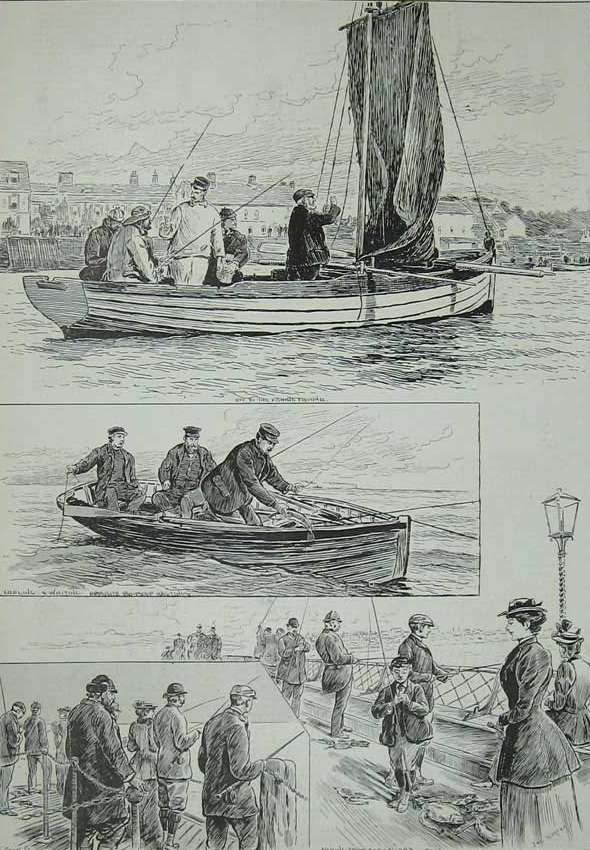
"Sea Fishing"
The Illustrated Sporting and Dramatic News 24th November 1894
"Hints and Wrinkles on Sea Fishing" (1894) "Ichthyosaurus" (A. Baines & Frederick George Aflalo) at pages 82 & 83
Sea Fishing near London
There are a great many seaside towns within reasonable distance of London; and it is nowadays quite easy to leave town after breakfast, enjoy several hours of sea fishing and return the same evening with a good basket of fresher fish than might even be sold at Sweeting's - no disparagement to that admirable establishment. [7]
… But there are ten times as many places where one can get the whole tides fishing, and only sleep the one night away; and these, being within eighty miles of town, are well adapted to the requirements of a summer holiday.
[7] Editor's note: Sweetings Restaurant in the City of London: 39 Queen Victoria Street, London EC4N 4SF, first opened for business in 1889.
"Hints and Wrinkles on Sea Fishing" (1894) "Ichthyosaurus" (A. Baines & Frederick George Aflalo) at pages 7, 9, 20 & 21
Introductory
There are many reasons for the increasing popularity of sea fishing. If there were a few more, I could even follow a prevalent fashion and tabulate them under two headings, the positive and the negative. By the positive, I understand the actual attractiveness of the sport on its own merits; its healthfulness, its increasing variety; the spice of danger which so commends it to Englishmen; the endless scope it affords for the exercise of manual dexterity and mental judgment; the beauties of nature with which it alone brings us in contact.
… Besides giving good sport and endless opportunities, the sea yields fish that are, with few exceptions, acceptable to the cook. Not perhaps the bony little pouting or the slimy conger (though the latter, if properly handled, is excellent), but almost every other fish of any size which can be caught from our piers or boats.
I come for a moment to the other advantages - the negative ones - to which I referred above; and the chief of these is that, once at the seaside, there is really nothing else to do …
Varieties of Sea Fishing
Luck, there is no denying, plays a great part in the filling of your basket, greater than all the axioms ever laid down in either practice or theory. But even luck has its limits. It will not give the fisherman a large haul in an east wind, nor will it bring flat fish among the rocks or gurnard to the surface. These are matters of rule, not chance.
"The Badminton Library: Modern Sea Fishing" (1895) John Bickerdyke at page 333
To any who would condemn sea fishing on account of the ease with which the quarry are captured, may I respectfully suggest a short course of mullet or big bass fishing?
Click The Badminton Library: Modern Sea Fishing to read online
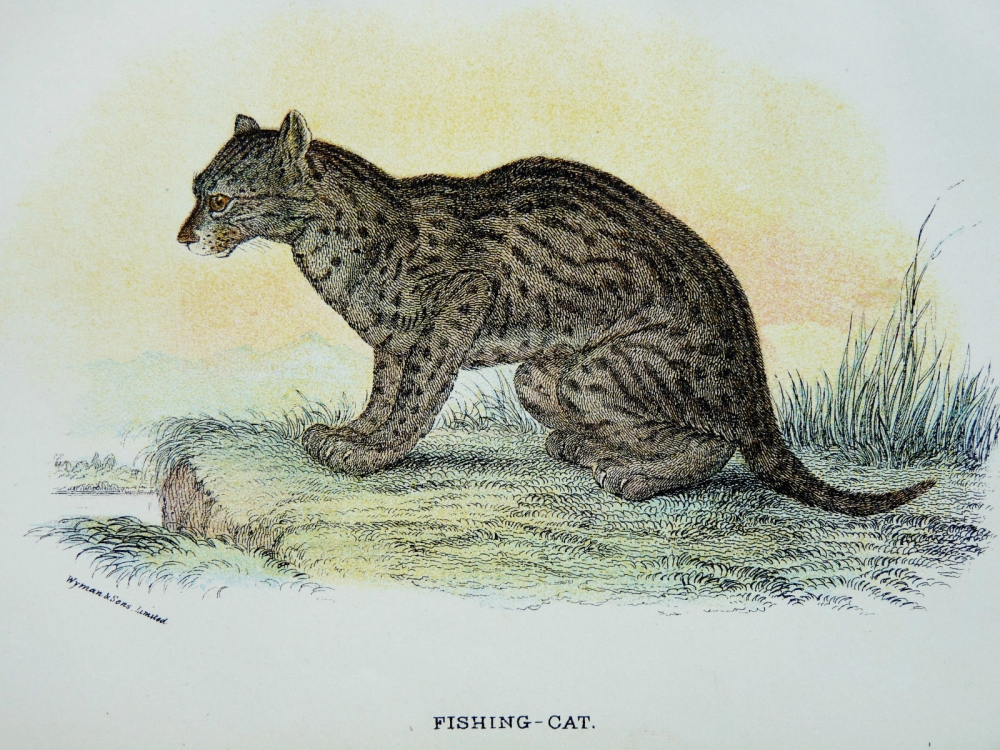
Fishing Cat
Lloyd's Natural History, edited by R. Bowdler Sharpe (1896-1897), London, Edward Lloyd
A Hand-book to the Carnivora (Richard Lydekker)
"Sea Fish" (1898) Frederick George Aflalo at page 1
'HAPPY England!' exclaims Goldsmith in his 'Animated Nature' [1], 'where the sea furnishes an abundant and luxurious repast, and the fresh waters an innocent and harmless pastime.'
… It is not easy, even for an enthusiast, to say anything new in praise of sea-fishing … the healthfulness of the sport, its cheapness, the variety of the sport, and the constant charm of uncertainty as to whether the result of an outing may be a blank, a boatload of fish, or a capsize.
[1] "A History of the Earth and Animated Nature" (1850) Oliver Goldsmith
Click Sea-Fish to read online
"Practical Letters to Young Sea Fishers" (1898) John Bickerdyke at pages 9, 10, 18, 19 & 330
I. Introduction
… Lastly, let us bear in mind that we are a maritime race living on a small island, that our supremacy in the world depends largely on our command of the seas, and that every boy who learns to paddle a boat, handle a tiller, swim a mile, or splice a rope, is acquiring knowledge of a kind which it behoves all young Englishmen to have. As sea fishing is often the first step to a knowledge of seamanship, and teaches us endurance, pluck, decision, and resourcefulness, I commend it to all youngsters, and to their parents. The great enemy of the human race, Sea Sickness, has, of course, to be grappled with, but he is more easily overcome in our schooldays than later on.
III: Boat Sailing
I regard the incident of boat sailing as one of the great charms of sea fishing. It is a most delightful pastime in itself. Even when the tides are awkward, or the shoals of fish are, through other causes, absent, there still remains an unending source of amusement in the few pieces of curved wood, canvas, and twisted hemp or manilla, which, put together, go to make up a sailing boat. Our good friends, the professional fishermen, will think all the better of us, and enter with all the greater zest into what they regard as the trivialities of our sport, if we prove that we can beat to windward in a nasty sea with the best of them, and lend a hand when needful. A pleasant way of ending a fishing expedition to some little sea coast village, is to hold a regatta for the local fishing boats. The prizes need not be silver cups. A few pounds of tobacco, or a Sunday dress for the good wife, will raise sufficient emulation, and, after all, it is the sport, rather than the prize, which should be the main thing.
XXXIII: Modern Improvements in Tackle Suitable for Sea Fishing
… Having come to the end of my tether … there only remains for me to bid farewell to you, my young sea-fishing friends, and to those of your elders who have dipped into these pages. May you exhibit in this matter of sea fishing perseverance, endurance, self-reliance, and pluck. They are the signposts which point to success in sea fishing, as, indeed, in most affairs of life.
"Dover as a Sea-Angling Centre" (1900) Deputy Surgeon-General Charles Thomas Paske at pages V, 4, 7, 8, 9, 15, 23 & 24
Preface
In conclusion, I earnestly hope that no member of the fraternity will have reason to turn over in his mind those doggerel lines - "The Fisherman's Lament" - sent me by a friend not long ago of which the following is a copy.
Comes slowly home and goes to bed,
Muttering words best left unsaid?
'Tis he who since the early sun,
Has fished all day on just a bun
And after all caught ne'er a one."
Chapter I
Having been firmly convinced some fifteen years ago of the adaptability of the rod for salt as well as fresh water fishing; bearing in mind also how every yard of river displays an ominous notice board as to dire penalties for trespass, and recollecting still further the many other impediments with which they are hedged in - none so formidable as that wanderer - yclept [6] game-keeper, with his insatiable appetite for palm-lubrication, Nature clearly pointed in a direction where keepers cease to trouble and the angler could ruminate in peace.
To trespass on the domain of the ethics of sport is a place where angels would fear to enter … For inspiration we turn to the book of Holy Writ, but find therein that silence reigns on this particular question. It contains no injunction or commandment for or against; … The Christian religion being wonderfully reticent on this point, it is curious to observe what an important part it plays in others. In the Buddhist, to kill even an ant either accidentally or wilfully means another transmigration before reaching the true Nirvana, at which rate it would cost the successful angler æons of time before he could come within measurable distance of the same abode of bliss … Through Hindooism the same thread is woven, though less prominently, inasmuch as certain animals are killed for sacrificial offerings … The Koran again stoops not to mention anything so trivial, but - with a large B - inculcates hacking to pieces two thirds of those whom God created in His own image and likeness because they are not of the (?) Faith, and Mahomet will receive such into his capacious bosom. With the above brief allusion to the subject, the reader must form his own opinion … All this notwithstanding, make it a rule to kill your fish as soon as fairly landed. To see them die of asphyxia is painfull to the real sportsman, and their struggles in the boat or basket distressing to a tender conscience.
[6] Editor's note: yclept - by the name of
Chapter II
… There are ways and ways of approaching both women and fish, and unless this be done in the right one, a swirl, a disturbance, a rude awakening awaits the incautious would-be aspirants to fame - or matrimony. Gentle, unobtrusive persuasion, careful handling, the dangling of pretty, glittering articles before their eyes, are the signs pointing out the road to success, while noise, roughness and a brusque manner lead to goodness knows where.
Chapter III
Nevertheless, balm in Gilead has by no means become exhausted. The angler can count on many serene days when, with a zephyr just rippling the sparkling bosom of the ocean, and Nature seems craving for a spell of rest, he can take up his position with comfort, eat his lunch without a twinge and smoke his own beloved pipe in peace.
Ah, who can sufficiently expatiate, either in poetry or prose, on the comfort to be extracted from the plant which furnishes tobacco when indulged in with moderation ? It ranks in the "Distinguished Order of Merit" along with opium; one so potent in soothing mental discomfort, the other bodily. Seductive at most times, in angling it steps in to fill the vacuum of that lull which but too often occurs when the denizens of the deep are either sulky, satiated or non est. And, for the most part, to those times it should be confined … if the angler will suck at a pipe when wielding a heavy rod with fish on the alert for whatever they can find in the shape of food, himself alone can he blame if his strike come too late, or his pet briar drops into the water, floating leisurely away with the current …
The South Eastern Gazette, Tuesday 22 May 1900 at page 5
Town & Country Notes
The casual angler who has visited Dover and not taken much trouble to test its capabilities, or to make him self-acquainted with them, will probably be surprised at the good account given of the station, from a sea angling point of view, in a book written by Deputy-Surgeon-General Paske, a name that will be familiar to all who are acquainted with the literature of sea fishing. It is shown that there is a distance of from five to six miles between point and point to which the angler should direct his attention. The author describes them as happy angling grounds, lying, for the most part, between the two extremes. To be sure, there are such dangers as sudden sou'-westers, perplexing sea fogs, and a current running at the rate of four miles an hour; but Dover shares these things in common with other stations. For the practical instruction of the reader this ground is divided into three parts, the first extending from the South Foreland to the East Cliff, the second from this to the eastern aspect of the Admiralty Pier, and the third from that structure to where the cliffs recede in land. Pouting, plaice and dabs are to be caught nearly all the year round, with occasionally soles. Codling in the autumn are abundant, and the uncertain silver whiting will be certainly found some time during October or November. In highly favoured spots, where rocks and seaweeds abound, and round about the piles of certain works, pollack and bass are to be met with, and there seems to be a considerable amount of fishing to be managed from the shore. Bass are caught after dark by hand-lines thrown from the beach, and it is suggested that the brilliant lights facing the bay attract these fish as well as pollack. The stone jetty opposite the War Office, the promenade pier, the two projecting horns forming the entrance to the harbour, and the Admiralty Pier all offer advantageous positions to the visiting angler who does not care to go afloat.
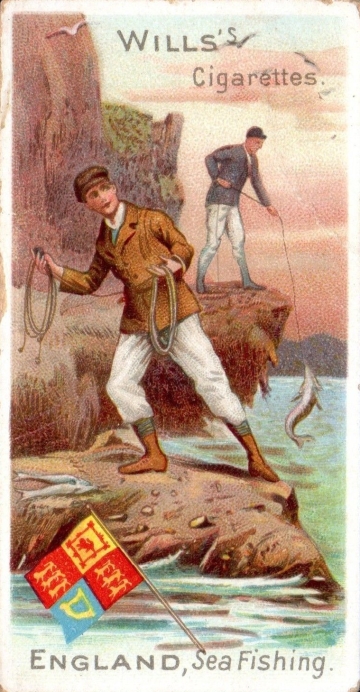
England, Sea Fishing
Wills's Sports of all Nations (1901) No 19
The Daily Express, Monday 8 August 1904 at page 4
Sea Sport in the Holidays
Details of Rod and Line Fishing Among the Silver Waves
It is a happy coincidence that the height of the holiday season should also be the heyday of sea-fishing for the amateur. For sea-fishing, with rod and running line, is one of the finest sports in the whole wide world.
Whether you fish for tarpon in the Gulf of Mexico, or for tuna off the Californian coast, or for bonito in equatorial waters, or for bass in the English Channel - and I have fished for them all - there is this delight common to them - the sense you imbibe into the very bones of you of absolute healthfulness, of physical exultation, of bodily vigour, and, in addition to all this, the assurance of sport both good and free.
As a consequence, perhaps, in the last half a dozen years, English sea anglers have increased and multiplied to an extraordinary degree. It seems but the other day when it was only a rare visitor who wandered out to the pier-head or was rowed a mile or so out to sea, there to work in see-saw fashion the coarse, hard lines of the professional fisherman.
But now, how great a change! At a hundred points round the coasts of Great Britain you behold eager contingents of sea anglers. Nor is there anything primitive about their tackle.
Go to places like Dover or Deal, Weymouth or Plymouth, the Isle of Wight or the Isle of Man, and be convinced and converted by the companies of anglers you will see there, glorying in their sport and hilarious with their success.
Round the Coast
Or start from London and work your way round the coast. Off Westgate, Margate and Ramsgate, if you care to go out in a boat, you can make a good bag of cod, pollack, whiting and, with fair luck, of the sporting bass. If you fish from the pier, you must be content with humbler spoil - whiting, trout, and dabs though, perhaps, an occasional grey mullet.
Then, as you go along the coast, you reach Deal - which is perhaps the best sea-fishing station within a hundred miles of London. Off the pier you can make good bags of cod and whiting, and those who go seaward in boats return at night with rejoicing and bringing their spoils with them. These may include the powerful conger-eel, whose entrance into the boat often prompts in the amateur angler a desire to get out of it.
Passing Dover, where excellent pollack fishing from the Admiralty Pier and the jetties is now in full swing, the sea angler has the choice of Folkestone, Hastings (good for conger, and even bass, if you fish from the east breakwater), Bexhill, Shoreham, Littlehampton (where I have caught bass and grey mullet both in the harbour and off the long wooden pier), Chichester Harbour, and Hayling Island - also good for bass and mullet. Then at Weymouth you can got good sport with most summer fish, as well as in the little-known but lovely bay of Charmouth, and off the rocks of Lyme Regis. And from here, all along the coasts of Devon and Cornwall, the fishing gets better and better, and the fish larger and more full of "play." The same holds good of the north coasts of those counties, of north Wales, and especially of Barmonth, where fish run large, of the Isle of Man, and, of course, of the greater part of Scotland, where in the deep fiords of the coast that splendid fish, the sea-trout, makes his appearance.
Famous Fisheries
Of the east coast of England, Yorkshire offers the best fishing – Scarborough, Whitby, and Filey being famous for their whiting, haddock, and coal-fish. At Mablethorpe, in Lincolnshire, some fair sport may be had, and towards the end of the summer holidays you can make heavy bags off Yarmouth and Lowestoft.
The best known stations - i.e., where boats and fishermen are most easily procured and the wants of the sea angler are perhaps most studied - are Deal, Dover, Hastings, Littlehampton, Weymouth, Devonport, Plymouth, and Megavissey, Barmouth (in Wales), and Port Erin and Ramsey (the Isle of Man). But I would strongly recommend, for the beauty of their natural surroundings as well as for the sport they offer, the seaside village of Charmouth (which lies like a sleeping beauty on the bosom of a great green hill), the quaint little town of Lyme, perched as it is on the edge of a blue lias cliff, the red coast of South Devon, especially about Brixham, the old-world town of Looe, and the lovely coast between the bay of Bideford and the wooded glens of Lynmouth. Of all sea-fish in British waters the bass, the pollack, the mackerel, and the grey mullet afford the best sport with rod and line, and are the most satisfactory fo catch.
The three first fish may be caught nearly anywhere just now in the English Channel, but Margate, Dover, Shoreham, Littlehampton, Hayling, Chichester Harbour, Devonport, and Plymouth are almost the only places where you may rely on finding grey mullet.
A . M . B .
The Daily Mirror, Saturday 20 August 1904 at page 6
Much News in Few Words
Jewelled Mackerel
Sea angling has received an immense impetus at Bridlington, which bids fair to make it the most popular pastime on the Yorkshire coast. A lady has caught a mackerel with a gold ring in its mouth.
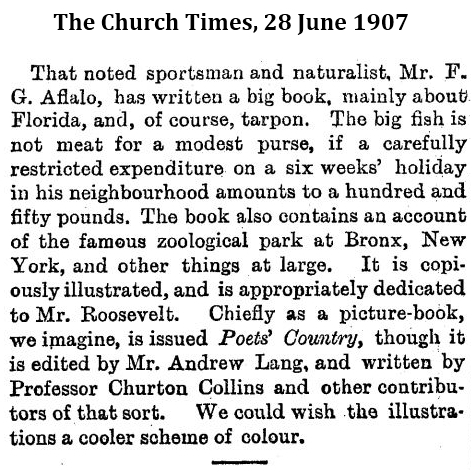 |
 |
"Sea Fishing for Amateurs" (1904) Frank Hudson at page 1
In hunting, shooting, racing and angling, Englishmen are supreme. By English authors have been written the best guides to those sports; yet, strange to say, there is one branch of sport in which, as islanders, we ought to be leaders, but which is little thought of as a rule. I refer to sea-coast fishing - one of the most healthful and delightful of pastimes. Indeed, I very much doubt whether there is any other description of sport so calculated to afford strength to brain, lung, and muscles. What can be more beneficial than a row over the dancing waves, each stroke of the oar expanding the chest, and each breath you take laden with life-giving ozone? If any jaded, over-worked Londoner would but follow my prescription for one fortnight in the summer season, I would guarantee to send him back to town strong as a lion and clear as a bell.
Click Sea Fishing for Amateurs to read online
"An Angler's Year" (1904) Charles S. Patterson at pages ix to xii
Preface
Of the writing of books - especially angling books - here is no end. From the day when Dame Juliana Berners perpetrated her "Treatise on Fysshynge" down to the date of the issue of the latest prose idyll by Sir Edward Grey on "Fly-fishing", every department of the sport has been treated of by a multitude of writers. The necessity of apologising, therefore, for adding still another book becomes apparent, and the excuse offered is briefly that the contents consist of practical experiences which may be of some benefit to others.
As we all know, angling as a sport has wonderfully increased in popularity during the last few years and - thanks to railways - has changed from a truly rural amusement to one of the favourite recreations of the town-dweller.
Some years ago, also, anglers were essentially men of leisure, who could afford themselves ample time and opportunity to slip away to some rural retreat, far from the madding crowd, for somewhat lengthened periods. Some, indeed, devoted nearly their whole lives to one or other form of this sport. Thus, when a friend once asked Stewart, the author of "The Practical Angler", as to what he was at that time doing for his living, he replied, "Man, I'm an angler", judging this evidently an occupation requiring all his talents and energies. Nowadays, however, things are much altered, and the great multitude of rod-fishers are working men whose only chance of sport is an odd day snatched now and then from a busy life. By "working men" my readers must not think that I mean alone the horny-handed sons of toil who have arrogated to themselves the title. I refer rather to the men who constitute the backbone of the country, the busy workers with either hand or brain, or both, who tend the great machine which goes to keep our Empire in the forefront of the nations.
To these men, angling comes as an engrossing recreation which, taken in small doses, tends to relieve the monotony and strain of modern existence. Such have but a limited time for the enjoyment of sport, and from that must be further subtracted the time taken up in reaching the scene of action and returning: therefore, the places that they fish must be easily accessible.
The busy angler has but little leisure to search out waters for himself, learn new methods, or try strange lures; but little information on these points is given by the average book on angling, and can indeed be only learned in the first instance by experience.
The experiences of others, no matter how limited in extent they may be, are always of some value as teachers, and indeed, as Sir Edward Grey says: "Even a little imperfectly told becomes interesting, and weak words stir kindred memories."
It is in the hope that this may prove the case that this little book is put forward, and the writer will be perfectly satisfied if it should, to some extent, meet the want for others which he has so often felt for himself.
Most of the experiences given are records of single day's angling within easy rail of London. As a sporting centre the Metropolis would hardly be chosen by many - most of the great centres being more, or at least as, favourably situated in that respect. It has, however, been my fate to live in the great city, and therefore the localities described are within a moderate railway journey in the Southern, Eastern, or Western counties. Equally varied and excellent sport can be obtained, no doubt, on other and more northern waters, while the methods given may be practised with as much or even greater success on lakes, rivers, and seas, within even easier reach of those whose occupations require their residence in the Midland or Northern counties, in Ireland or Scotland, or in those Greater Britains across the seas.
It has been my endeavour, in the opening chapter, to give, not a systematic enumeration of the different varieties of tackle, but rather a description of certain general modifications which practical experience has shown to be specially useful. The remainder of the book is divided into months, in each of which (excepting March, the silly season of angling) a description is given of some kind or kinds of rod-fishing, in the practising of which at that time of the year I have enjoyed the greatest success. It is not suggested for one moment that these forms of angling should be only, or chiefly, practised during the months under which they are here given; but merely that such months have in the past afforded to the author the best sport with those kinds of fish in that special locality. In each chapter an endeavour has been made to describe - firstly, the haunts and habits of the fish; secondly, the special tackle and methods used; and thirdly, an actual record of a day's fishing.
In speaking of tackle the names of makers, patentees, and sole agents are mentioned, as sometimes the most useful forms are but little known. Consequently, should the would-be purchaser ask for them from some rival firm, he is apt to be supplied with an inferior imitation.
Some of the matter in these chapters has already seen the light in the pages of the Field and the Fishing Gazette but has now been to a great extent re-written, and thoroughly revised. Where such matter has been used, my best thanks are due to the proprietors of those papers, who have kindly permitted me to use the whole or a portion of such articles, as and how I may feel disposed.
It will be noticed that the scope of this book is not confined to any one form of rod-fishing. I have always felt that for a record of angling month by month to be of any use to the angler of moderate means, as general and comprehensive a view as possible must be taken. The including of sea rod-fishing as an angler's sport needs no justification nowadays, as the introduction of modern tackle and improvements has resulted in the fact that as much, if not more, sport can be obtained in the sea as in the river or lake by an equal or less expenditure of time and money. When sea-fishing meant pulling out fish by brute force it was excusable that the true angler should refuse to include such in the category of sport; but nowadays such primitive fishing, even for the largest and most powerful sea-fish, is rapidly becoming a thing of the past, and monsters of 400 pounds and upwards are taken on rod and line.
In conclusion it is hoped that a lover of fishing may find within these pages matter which, when he is on angling holiday bent either in spring, summer, autumn, or winter, may contribute something to make that holiday a period of enjoyment while it lasts and a pleasant memory to look back upon. Should this prove the case, no matter to how limited an extent, the author will feel his time has not been mis-spent when writing these pages.
"Practical Sea-Fishing" (1905) P. L. Haslope at pages 1, 2, 3 & 5
Introductory
Of all sports there is none that should appeal so strongly to the average Briton as sea-fishing. Other pastimes, such as hunting, horse racing, or motoring, may fairly claim to be more dangerous and exciting, but a day on the sea with pleasant companions and in a good locality for sport affords more lasting enjoyment than any. One of the greatest charms of sea-fishing lies in its glorious uncertainty, for when the line has been baited and cast in it is often impossible to foretell what you may bring up. This pleasurable anticipation is always present, and although it may not always be fulfilled, yet the angler may reasonably hope that he will be successful. Blank days will occur to the best of fishermen, even when the conditions appear to be most favourable; but in the sea it is rare for the amateur to return without some reward for his efforts. The assertion that our recreation is monotonous is hardly well-founded, for the sea is ever changing; every day a fresh scene is presented to the view, and what better opportunity is there of studying its various moods ?
As a matter of course sea-fishing has been practised from the earliest ages. Everyone is doubtless familiar with the miraculous draught of fishes, as recorded in the New Testament; and, as an instance of the use of lines, there is our Lord's injunction to St. Peter,
"Go thou to the sea, and cast an hook and take up the fish that first cometh up." [4]
We have, therefore, the highest possible authority on our side that sea-fishing generally is a useful and an interesting occupation to follow.
Unlike rivers and lakes, now so jealously guarded, the sea is free to everybody, and the amateur can cast his line where he pleases without any fear of being ordered off …
Every year people from inland towns flock in thousands to seaside places to spend their summer holidays, yet of all these pleasure-seekers there are comparatively few who know much about sea-fishing, being often ignorant of the names of the commonest fish. It is hoped that this little work may help to enlighten such, and lead them to adopt a healthful recreation, and one that will be found more beneficial than many commonly sought after at fashionable resorts.
… the visitor, weary of town life, will find his time fully and enjoyably occupied, and after a few weeks' holiday spent in such a manner will return home feeling a different man. No better cure for the anxieties produced by the hurry-skurry, luxurious age in which we live can well be imagined, and to most people such a form of recreation will do more good than all the medicine ever prescribed. Those who seek health should therefore adopt sea-fishing as a pastime, when they will soon forget all their ailments.
Click Practical Sea-Fishing to read online
[4] Matthew 17:27
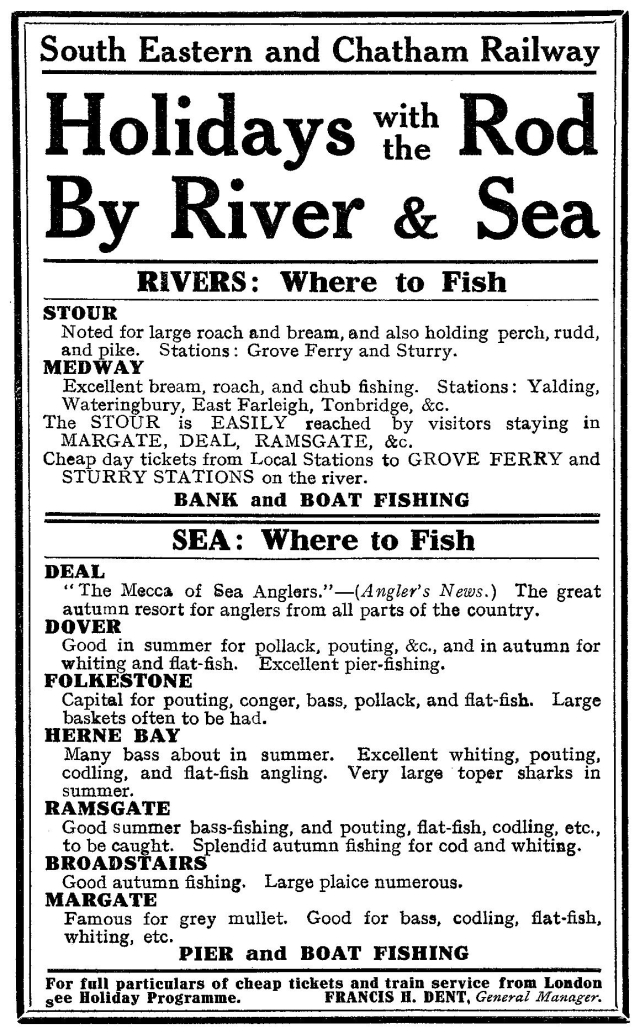
"Sea-Fishing" (1911) Charles Owen Minchin
"Modern Sea Angling" (1921) Francis Dyke Holcombe at pages 1, 13, 14 & 256
Introductory
Of all the sports of which the average Briton is proverbially so fond, probably sea angling has made the biggest strides in popularity and progress during the present century, with the possible exception of golf; although that perhaps can hardly be called a sport, for as someone unconverted to the game has rather unkindly said, it is neither work nor play, but a disease ! For every amateur rod fisherman in salt water when the British Sea Anglers' Society was founded in 1893 there are probably scores today; and there seems every likelihood that their numbers will be very largely added to in the years to come.
There is one type of sea angler extant - fortunately quite uncommon - who is never so happy as when he can "wipe the eye" of a brother fisherman by beating his catch. The writer has no use whatever for this gentleman, and he hates, as the devil hates holy water, a selfish, an envious or a jealous fisherman. If the sea angling novice should come across any such he may safely be counselled to give him a wide berth.
There is one other quality which the sea angling novice will do well to cultivate if he can, and that is a certain light-heartedness and buoyancy, even irresponsibility, if you will. The writer finds it just a little difficult to put his exact meaning into words; but he feels that some sea anglers in our waters take themselves and their sport - particularly themselves - much too seriously. This is a mistake. After all, sea angling is a sport, a game, a recreation, or what you will; it is not the serious business that some men make of it. As a sport it is a wonderful thing for keeping a man young; but if it can be taken too seriously it may have an exactly opposite effect.
On the Choice of a Fishing Station
… a good many who take up the sport seriously will experience three different stages in their devotion to it. In the first stage one wants to catch a lot of fish, a desire which it is often pretty easy to gratify in the sea if one knows the right way to go to work; in the second stage one wants to catch big fish, which also is not particularly difficult if one is prepared to go far afield; while in the third stage one wants to catch sporting fish, and to catch them in a sporting way.
"Sea Fishing Simplified" (1929) Francis Dyke Holcombe & A. Fraser-Brunner at pages 3 & 4
Chapter I
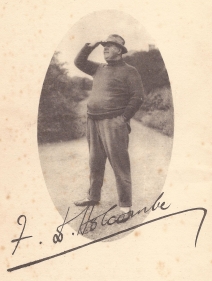
Sea fishing with rod and line has greatly increased in popularity in recent years, and today there are thousands of keen and enthusiastic sea anglers of both sexes throughout the country. Many of these belong to a Sea Fishing Club, for nowadays there is a considerable number of these in existence. London has the British Sea Anglers' Society, which in a sense is the parent body, and one or two others, while there is hardly a seaside town of any importance on the English coast that has not its Sea Fishing Club or Association; some have two or three.
In spite of these facts, it is fairly safe to say that to the large majority of summer seaside visitors, the joys of what is a really delightful and health-giving sport are unknown. It is to these summer migrants that this book is addressed; and if it succeeds in converting some of you to the sport, the object with which it has been written will have been achieved.
You will find that sea fishing makes a very pleasant change from listening to the band on the promenade, or sitting in a deck chair on the sands with a pipe and the daily paper; while it is quite likely that the catch - and it is seldom that one returns empty-handed from a sea fishing expedition afloat - will be regarded with favour by your "better halves".
Almost all our common sea fish are good to eat, while some are really excellent; and the difference in flavour between fish cooked and eaten on the same day on which they are caught and those which come from the fishmonger's slab is remarkable. Boiling in seawater improves the flavour of any fish which are cooked in that way.
All fish, by the way, should be killed directly they are caught, and "cleaned" as soon as possible afterwards; while if it is a sunny day keep them in the shade by covering them with an oilskin or a piece of old sacking. In hot weather, especially if there is thunder about, some sea fish - pouting and mackerel, for instance - deteriorate pretty quickly.
"Sea-Fishing from the Shore" (1940) A. R. Harris Cass M.B.E. at pages 18 & 29
Foreword (E. Marshall-Hardy, Editor of Angling, 9th May 1940)
There can never be too many books which help to unravel the mysteries of the greatest of sports …
Chapter I
Why Fish ?
Now for fishing as a sport. With a full-blooded drive, to send a ball out of the ground, for a six; to hole in one; to breast the tape after a strenuous sprint; to break through, flash along the line, dodge the full back, and then grass the ball behind the goal posts, these and similar outstanding incidents will produce a thrill on recollection, but believe me, for I have sampled them all, not one will compare with the gasp that accompanies the memory of the capture of a big bass.
Chapter II
Fish to be Caught
… do not take angling too seriously, but enjoy its many attendant pleasures, for there is always something worth noting apart from the feel of the line.
"Sea Angling: Modern Methods and Tackle" (1952) Alan Young at page 11
Sea-Angling Methods
The writers on sea angling can be counted on the fingers of two hands, and even among this limited number the majority wrote in a strictly practical way. This book joins the ranks of the practical, but I feel that I shall look forward to the time when gifted sea anglers will write books which reflect something of the delights of sea fishing, portraying, perhaps, the break of dawn seen from a small boat; the attractions of the birds which haunt the sea coasts; the immense satisfaction gained from catching a bass in difficult circumstances after days of fruitless fishing; and something of the recurrent surges of the tides which weave themselves into the life of the ardent angler. I look forward to such a book, but sea anglers do not seem to be inspired to write as do their opposite numbers in fresh water, and it may be that something in the sea itself has a dampening effect on any desire to write, so that a reticence which results in the Navy's being called 'The Silent Service' has developed in a like way among salt-water fishermen.
"The Technique of Sea Fishing" (1953) W. E. Davies at pages 9, 10 & 11
Of all the varied types of angling none holds greater fascination than sea fishing. If this were not true, the sport which has on more than one occasion been claimed the most health-giving of all, would not be followed by so many. Nor would there be so insistent a demand for knowledge of the fundamentals of this kind of fishing. It breathes an air of repose and satisfaction, a spirit which when it refers to outward circumstances is called contentment, and when one refers to oneself is called complacency. Sea anglers, in fact, do not think ill of themselves, and of their sport they think exceedingly well.
… In sea fishing, whether it be from rocks, beach, pier or boat the man who catches more fish than his fellows is usually one who has the capacity for taking pains - not only in the big matters but more so in the minor things. Above all else he makes a careful study of fish, their habits and reactions to the varying conditions of their restless habitat.
Such a man inevitably becomes a specialist for the simple reason that he leaves nothing to chance. For instance, he notes the topography of the shoreline and the flow of currents, phases of the moon, the times of the tides and last but not least, he invests in a survey chart of the coastal area he intends to fish …
… In recent years it has pleased me considerably to note the trend towards lightweight tackle. The true sportsman will always try his best to use tackle that will give him the greatest pleasure in fighting a game fish and at the same time give the fish a fair chance. No man, expert or novice, will ever derive the utmost fun from fishing until he has reached the point where he considers the battle far superior to the catch.

"Sea Fishing with the Experts" (1956) Jack Thorndike at page 5
Introduction
The blue, the fresh, the ever free ...'
"Ever free", wrote Bryan Waller Procter [2], and he might have been thinking of anglers. Sea fishing is unrestricted. It is free and it goes on all year round for, unlike inland game and coarse fishing, it has no close season. And largely because of that more and more anglers take up sea fishing every year.
[2] "The Sea" written circa 1837 by Bryan Waller Procter (1787 to 1874) under the nom de plume Barry Cornwall. Click "The Sea" to read the full poem and "The Fish, the Man, and the Spirit" by Leigh Hunt (1784 to 1859).
"The Modern Sea Angler" (1958) Hugh Stoker at page 206
Chapter Sixteen
Cooking the Catch
… Now for a few recipes, specially designed for the angler's wife, who - poor soul! - is liable to be called upon to deal with anything from a seven feet long conger eel to a handful of whitebait. Here's hoping the next few pages will help to lighten her burden.
"Angles on Sea Angling" (1963) Captain S. Norton-Bracy at page 5
The Lure of Salt Water Fishing
One of the great beauties of sea fishing is its complete lack of any formality and red tape. You don't have to bother your head about rod licences, fishery officers, or getting permission from anyone before you start. There are no close seasons for sea angling. You can fish when you like and pretty nearly anywhere you like. Another reason why sea fishing has such a fascination for anglers … is the tremendous variety of the fish. The best most coarse fishermen can hope for is a tussle with a 40lb or 50lb pike. At sea you can go fishing for flatfish for the pot - or tope, if you feel like having a go at a member of the shark family. Or you may even land up with a 200lb skate on the end of your line.
"The Art of Sea Fishing" (1964) Laurie Robinson at pages 1 & 2
Chapter 1
Sea Angling as a Sport
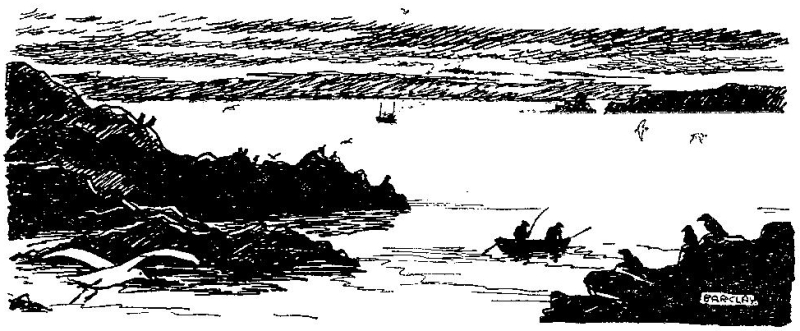
No branch of angling has shown a greater upsurge than sea angling over the last few years. Anglers today are going down to the sea in ever increasing numbers. This applies in particular to England where with the formation of a number of Sea Federations to which the many sea angling clubs have become affiliated, the sea angler is well catered for. Add to this the many thousands of unattached sea anglers and one realises the hold the sport now has in this country. The formation of the clubs and federations has led to the holding of many sea angling festivals all round the coast, leading to the exploring in great detail of the sea fishing potential of much of the coastline. A great change has come over sea angling … Add to this the fact that fishing in the sea is free - apart from small pier dues and boat charges - and the fact that it is teeming with a great variety of fish that you can catch, most of which are edible. Is it any wonder that sea angling is growing so popular? There is no close season to bother about; each season of the year brings its own variety of fish - in the winter the cod and whiting and in the summer the bass, the pollack and mackerel.
"Salt-Water Angling" (1965) Michael Kennedy at page xiv
Preface
Few sports offer more variety. Around British coasts some sixty kinds of fish are taken by the angler. There is sea fishing of one kind or another all through the year - in high summer and on frosty December evenings. One can fish from a boat or from the shore, in deep water or in the shallows, in the green water of an estuary winding through high, wooded hills, or in the churning surf along an ocean beach.
"The Sea Angler Afloat and Ashore" (1965) Desmond Brennan at pages xxi and 25
Introduction
Most anglers, when they first take up the sport, want to catch as many fish as possible but later their ambitions change from bigger catches to bigger and better fish. Gradually they begin to concentrate on those species which give them the most pleasure and eventually graduate to catching them on the tackle and by the methods which provide them with the greatest sport. It is then that they are getting the most out of angling.
Sea Angling has long been considered by those not participating in it, a crude and perhaps a rather unsporting type of fishing. Crude it may have been in the past but make no mistake about it not being a sport. There are gamer and more sporting fish in the sea than there are in fresh water and when taken on the right tackle they provide some of the finest fishing of all. Sea angling requires as much finesse and skill as any other form of angling, and if it is crude, the fault lies with the angler and not with the sport. In the past, due to the materials available, sea angling was "thick-eared" and on the heavy side but with present day tackle, technique and methods there is no excuse for unsporting fishing. Provided the angler has the right approach to sea angling and uses the right type of tackle he will find that he is enjoying the greatest sport of all.
The Fishes of the Sea
We in these islands are fortunate to live in a region where two major fish distribution areas meet and overlap. This affords us a much wider choice of species than would otherwise be our lot.
"Sea Fishing for Beginners" (1970) Maurice Wiggin at pages 13, 16, 17, 26, 28, 29 & 136
First Things First
And it is free. Free not only in the sense that no-one has to buy fishing rights in the sea, but free, too, of all the restrictions that hedge frehwater fishing around. The coast is free. If you can reach the water, you can fish it. You can fish it by night and by day. You can camp on the sea's margin and fish it round the clock without anybody's by-your-leave. You can light your bonfire on the beach and spend a thrilling night waiting for the pluck of the big cod, cooking bangers and bacon and brewing up hot drinks. You can roam the rocks and send your lure adventuring into the gurgling, pounding, sucking waves that swing the seaweed and the wrack in marvellous great whorls and vortices. You can go afloat and fish the tides around, no man's slave. You can fish every day of the year. There's no close season, no rod licences, no permits, no water bailiffs. The sea is free.
… And there are two more potent reasons for the increase in the popularity, and desirability, of sea fishing. One is the wonderful fact that much of what you catch is highly edible. There is nothing in the whole gamut of grub which tastes better than a sea fish cooked as soon as it is caught. Even a few hours later, after the journey home, it still tends to taste fresher than you would have believed possible …
One last thing may be said in praise of sea angling. It is the healthiest occupation known to man. True, it may quite easily kill you. It kills several anglers every year … However, all forms of sea angling provide you with vast quantities of the best air available. Appetites grow out of all recognition. Sleep comes easy to the man who has spent a few hours sucking in the old ozone.
… A day's sea fishing may indeed be as tranquil as a day spent sitting on the verdurous banks of a disused canal. You may sit for hours on pier or jetty or harbour wall dreaming away the sunshine in a placid reverie interrupted occasionally by inconsequent and indeed insignificant fish. But there are other occasions, the stuff of stories and dreams, which brace the whole system and infuse into the most torpid imagination those fleeting intimations of the heroic scale of life, which, once known, effectively banish boredom from the hours we have to spend in servitude between our acts of freedom and desire.
Chapter II
The Tools of the Trade
The multiplier was a British invention, but, like many another, was greeted by our countrymen with nearly unanimous lack of enthusiasm; with the result that it was taken up by dastardly foreigners who saw its potential, developed it to a high pitch, and now believe they created it.
… Some people will never cotton on to the multiplier, though it is the sweetest instrument a man can play on, bar the liquorice stick and possibly the bassoon. Well, there are get-outs. Prime among the get-outs comes the fixed-spool reel. This diabolical invention, which, like the aeroplane, should never have been allowed, is the lazy man's answer to prayer. Since many of us are profoundly lazy, let's have a look at it.
It was invented by the ingenious Illingworth, in the 'twenties, for the express and criminal purpose of casting a spinning lure of negligible weight (or even a worm) where a fly would have done just as well.
There is something divinely simple that marks this out as one of these great flashes of inspiration that come to peccable man every decade or so.
Chapter IX
Afterthoughts and all that
This is the glory and benediction of the sea. You 'cast your bread upon the waters', and you never really know, not for sure, what is out there waiting, what it is that has taken your bait or lure. Until you see it. The infinite ocean is inexhaustible in its capacity for surprising us. It makes a man humble, but self-reliant; willing to be surprised, capable of wonder, but ever adventuring his lure into the unfathomable sea with new optimism, new hope.
"Modern Sea Angling" (1970) Richard Arnold at pages 15, 16, 23, 187 & 188
Introduction
Round the British Isles there is a coastline over 5,000 miles in length. This coastline is, at its furthest point, only about 70 miles from the deepest inland town. British coastal waters teem with a great variety of sporting fish catering for all tastes from the big game angler who seeks the sea tigers, the shark, or the fly fisherman who fights a small species, the gallant mackerel which is weighed but in ounces. The contemplative angler may sit with leger, or float: the more energetic type, who looks forward to a test of skill and muscle, may join in that new British pastime, shark fishing. It is typical, of course, that the British sportsman has neglected this sport which, right on his own doorstep, can be reckoned amongst the best in the world.
... The sea angler is a fortunate man ... It matters not that he receives not even the slightest semblance of a 'knock' all day. He may stand muffled to the eyebrows, protecting himself from the fury of a gale beating on the wintry shore; he may, lazily, from a stool, clad in bathing trunks, drowsy with midsummer heat, fish in comfort from a pier. He may delight in the delicate art of fly fishing, or prefer the trial of brute strength in a contest with a big fish. But though there may be no piscatorial success it matters not. The air is clean. The day, or night, is spent in the healthiest out-of-door atmosphere in the world, and that, in itself, should be sufficient justification for sea angling.
Angling Afloat
Sea angling is, therefore, a sport which has many different aspects, caters for all tastes, is not affected by the age, sex, or social condition of the enthusiast. It is one of the oldest of all sports, and yet at the same time enlists the most modern techniques and materials in its execution.
To angle in salt water is to appreciate wild nature at its best: the restless, unconquerable sea, blue one day, brown and foam flecked the next: the mysterious waters advancing and receding twice daily, teeming with life of which we know very little: the smell of the air, the varying seascapes, the different backgrounds of sky, even the constant procession of large and small ships of all nations, the graceful manoeuvres of the sea birds, as well as the sport itself are all there fro the angler to enjoy, free for the taking. Wooded shores, desolate beaches, singing sands, fearsome and majestic cliffs, give the sea angler every variety of scenery he can imagine, whether there is a background of mountains, or just a shimmering, restless, many-coloured expanse of water beyond him.
Your true sea angler knows that restless urge, that call to the tideline and beyond which inspired the poet, though in a different context: that call so powerfully yet simply stated [3]:
To the lonely sea and the sky.'
[3] "Sea Fever" written by John Masefield (1878 to 1967). Click "Sea Fever" to read, and listen to a recorded reading of, the full poem.
"Successful Sea Angling" (1971) David Carl Forbes at pages 11 & 12
In a world where so little is left entirely to the whim of the individual, fortunately there is still fishing. There are virtually no rules, no times to start or to finish, very little that is truly predictable, much that is speculation, and great scope for ingenuity. The words 'always' and 'never' do not apply in sea fishing.
It is hardly surprising that in recent years there has been such a great increase of interest in sea fishing. There are no frontiers or limitations to the sport to be found in the sea, and one takes as much from sea fishing as one puts into it ...
Of all the diversifications to be found in angling in general, none are so wide as those to be found in sea angling in particular. For here there is something for everyone, from the boy who joins in the fever of excitement when the mackerel shoal inshore, to the experienced angler who waits over the deeps for shark; and the motivation is the desire to catch fish.
"Sea Angler's First Handbook (Pan Anglers' Library)" (1975) Alan Vare & Arthur E. Hardy at pages 89 & 93
Sea Fishing Methods
Shore Fishing
… The main thing to remember, when playing a fish, is - and this is vitally important - keep a tight line. But, and here's the secret, don't be too forceful; the line, your rod - and the fishes' mouth, can stand so much pressure, after which, bingo! everything is lost. This fish-playing is rather like handling a horse (perhaps even a woman!): it is just that sophisticated degree of gentleness, that makes the day.
Fishing from Piers, Breakwaters, Jetties and Rocks
… Quite the reverse type of angler, encountered all too often, is the 'Pier Menace', with his characteristic heavy line and light leads. His tackle will be drifting, constantly, into everyone else's on the pier, always supposing that he hasn't cast it there in the first place! The worst breed of Pier Menace is the noisy one, with his continual boasting, complaining and commenting. Noisy Menace will 'borrow' bait, leads, swivels, hooks - and anything else he can lay his fatuous hands on, anything from an aspirin to a cup of soup. Avoid him like the plague - and do, please, try not to develop into one yourself, not even a little one. We're sure you won't.
"The Guinness Guide to Saltwater Angling: Light tackle technique for British waters" (1977) Brian Harris at page 9
Foreword (Leslie Moncrieff)
There is little doubt the sea angler is a hardy breed of sportsman. Throughout the year, regardless of weather conditions, he stands on desolate beaches, often at night, braving the biting wind and penetrating spray from heavy surf. Furthermore, with the quality of fishing improving considerably during autumn and winter months, a boat angler fares little better. On many occasions, often in open boats, he is tossed around from dawn to dusk, the only comfort a flask of coffee and sandwiches.
Even on more pleasant occasions I often wonder at the patience shown by the angler as he gazes intently at the rod tip, almost, it seems, willing a fish to take his bait. Little wonder therefore the angler is the butt of the cartoonist and considered slightly crazy by the general public.
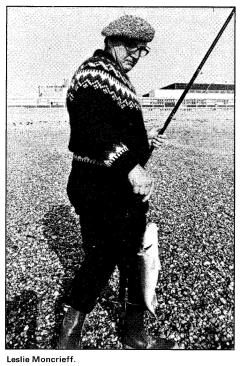
Somewhat eccentric the sea angler may be, but the deep affection he has for this chosen sport allows him quickly to identify sound sincere angling writing.
There are journalists, often quite professional, who seem more concerned with the flow and arrangement of words, rather than the subject itself; often they attempt to write with authority on subjects well outside their experience. Such shallow words are quickly ignored by the sensible anglers.
On the other hand there is the true angling journalist, writers such as Brian Harris who have fished all their lives with dedication, affection and concern for the sport ; such enthusiasm can be instantly recognised by the accuracy and sincerity of their words.
I remember Brian in his late teens fishing my patch from the steeply shelving beaches of Dungeness through to the rocky ledges of Winchelsea. Even in those days he had this enquiring mind bordering on the nuisance. My most enduring recollection is of him walking along the beach, spade and rod in one hand, with a bucket of worms, crabs and razor fish in the other.
From the practical down to earth task of bait digging to the Editor of a successful magazine in a few short years is no mean feat, and a sure indication of the Author's competence in the sea angling field. His obvious love of our sport is the reason I am happy to contribute a foreword to this excellent book 'The Guinness Guide to Saltwater Angling - Light tackle technique for British Waters'. The Author has not made the mistake of over stretching the subject matter but confines himself to discussing 25 of the most popular sporting saltwater fish in detail. The fish included are the most popular found around the British Isles. Their natural environment, methods of capture, including bait and tackle are described in depth. The amount of colour work with excellent photographs and line drawings, printed on high quality paper, are quite outstanding.
Brian Harris' approach to sea angling is very much my own, simple and direct. It is not always an easy task to explain on paper, at least in understandable terms, the important details that make the difference between the average and outstanding angler.
This book, however, is a distillation of a practical angler's knowledge that must prove invaluable to both beginners and experienced anglers alike.
Leslie J. Moncrieff
"Sea Angling from the Seashore" (1982) Ray Forsberg
The aptitude for being in the right place, at the best time, to present a suitable bait to a fish which is in a feeding mood, and then to hook, play and land it successfully, is what distinguishes accomplished sea anglers from the "cast out and hope for a miracle" operators.
"The Sea Angler's Guide to Britain and Ireland" (1982) John Darling at page 5
Foreword (Michael Fish, London Weather Centre)
As I seem to have a reputation for forecasting bad weather and even by some, held responsible for it, I feel I must impress on anglers, if nothing else, that it is essential to seek meteorological advice before contemplating a fishing trip … Give the barometer a gentle tap, for instance. If it shoots down think twice before going: even more so if the cloud is thickening and lowering. Sometimes a rapidly rising barometer can spell trouble, too, as strong winds can come along just behind a depression. As a final piece of advice, do take a radio with you, as this will enable you to keep an ear tuned for the gale warnings and regular shipping forecasts … If you hear a gale described as 'imminent' that means it will occur within six hours, 'soon' means between six and 12 hours and 'later' means more than 12 hours away. Anyhow, that's enough preaching from me … [5]
[5] Editor's Note: Michael Fish who, in a weather forecast at 21:30 on the evening of 15th October 1987, informed millions of viewers that
"earlier on today apparently, a woman rang the BBC and said she had heard that there was a hurricane on the way. Well if you are watching, don't worry there isn't …"
The worst storm in living memory (a 1 in 200 year event) occurred during the early hours of 16th October 1987, with storm force 11 'hurricane-strength' winds. As dawn broke, 18 people had lost their lives and 15 million trees had been uprooted. In an interview with the BBC Michael Fish explained that
"there were remarkable rises in temperature, in some cases up to 10, even 12 degrees C in the space of only 20 to 30 minutes. Likewise we had some huge rises in pressure - of 25 mille bars in some places - again in just a few minutes. Although you think of low pressure causing strong winds - it wasn't. It was an extremely rapid rise in pressure that was more the cause of the winds than anything else".
Next time, Michael, practice what you preach and give the barometer a "gentle tap" …
"Running with the Tide: A journey into Angling" (2013) Simon Smith
Salt. Sea salt; the sea; sea air; sea fishing; a tumbling, roiling, frothing tumultuous chaos that fully erupted into my life at the age of eleven, immediately washing down through the years and mingling with that early experience and all those extreme and conflicting emotions it still embodied five or six years later: fear, excitement, disappointment and optimism but, above all, the sense of a new world waiting to be discovered. Dangerous, yes, but bloody exciting.